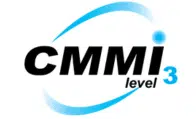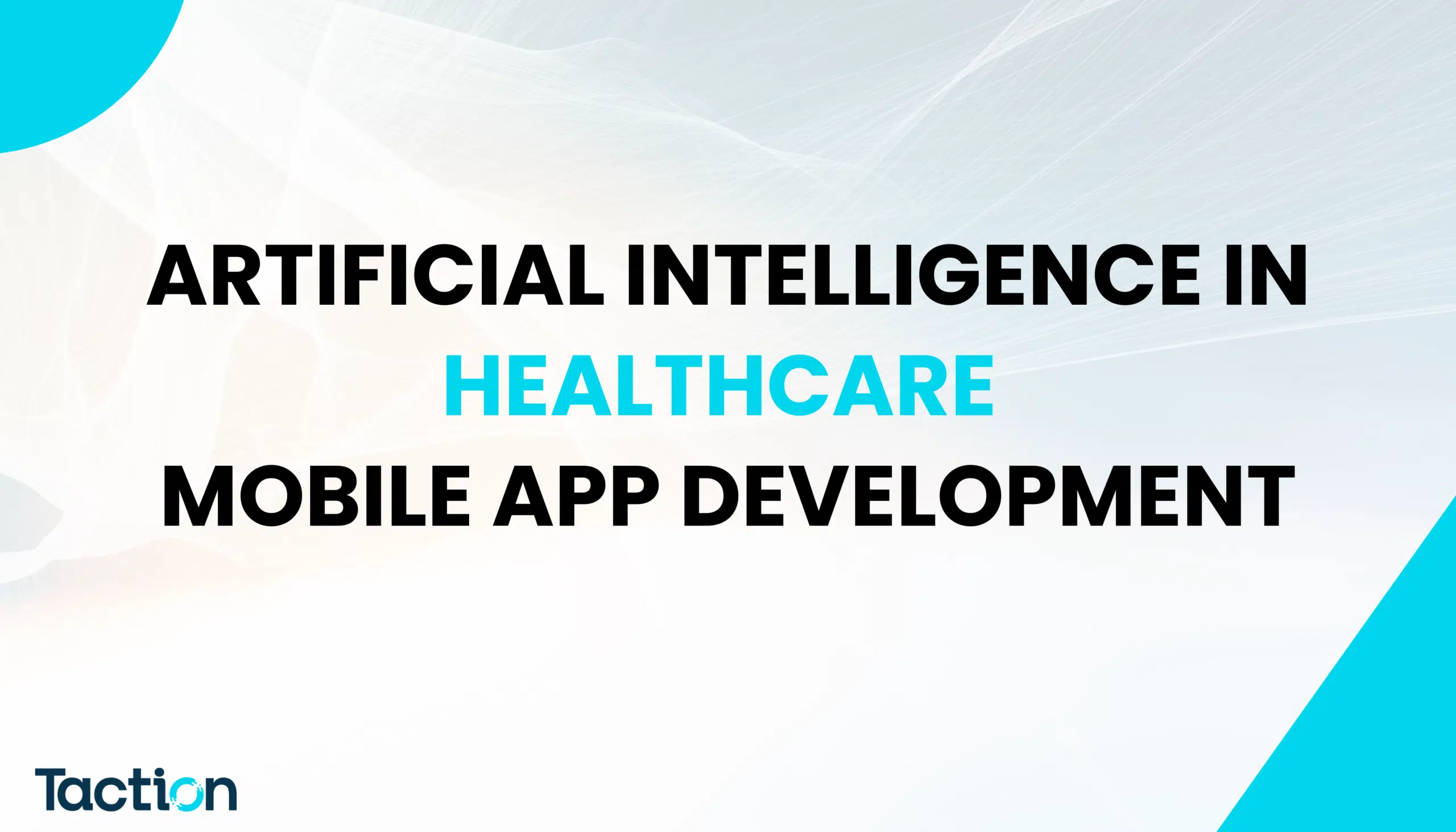Artificial Intelligence in Healthcare Mobile App Development The healthcare industry is experiencing a transformation through (Artificial Intelligence) AI which boosts mobile application capabilities by improving diagnostic accuracy and streamlining clinical tasks while boosting patient interaction. AI transforms healthcare delivery and management through advanced symptom checkers and analytic tools as well as chatbots that support telemedicine services. Taction Software leverages 19 years of healthcare IT knowledge to develop AI-powered mobile healthcare applications that combine cutting-edge AI technology with practical medical needs. Our solutions enhance clinical efficiency and patient care while securing data to comply with HIPAA and other regulatory standards. This article examines AI’s impact on healthcare mobile app development by examining key technologies that drive these changes and discussing real-world applications while addressing challenges and future trends. This guide provides healthcare providers, startups, and enterprises looking to adopt AI with insights into the benefits of AI-powered healthcare mobile apps. Why AI is Revolutionizing Healthcare Mobile Apps? Despite widespread adoption in healthcare mobile applications users face persistent obstacles including inefficient patient management delayed diagnostics data security risks and insufficient personalization features. EHR system integration challenges plague many healthcare apps resulting in disjointed patient care and manual processing that delays treatment processes. The massive amount of healthcare data presents significant challenges in generating useful insights without utilizing advanced technological solutions. AI improves healthcare applications through better efficiency and accuracy while providing personalized care solutions. Machine Learning (ML) algorithms process substantial patient data volumes to produce real-time insights along with predictive diagnoses and customized treatment plans. AI chatbots deliver round-the-clock virtual support which helps shorten patient waiting periods and increases overall engagement. The Natural Language Processing (NLP) technology allows physicians to convert spoken clinical information into written documentation which saves them time. Key AI-driven features in healthcare mobile apps include: AI-powered symptom checkers for early diagnosis. Predictive analytics to detect potential health risks. Automated appointment scheduling for seamless patient flow. Remote patient monitoring (RPM) with AI-integrated wearables. AI-enhanced drug discovery and clinical decision support. Through the adoption of artificial intelligence technologies healthcare providers are able to offer more accurate data-based and widely accessible care which leads to improved patient results and enhanced operational effectiveness. Harness the power of AI in healthcare mobile app development. Let’s create innovative, compliant, and intelligent solutions together! Get Started Key AI Technologies Powering Healthcare Mobile Apps The healthcare industry is experiencing a digital transformation as Artificial Intelligence brings advanced diagnostic tools to healthcare mobile apps with automation capabilities that tailor patient care. AI-powered innovations are defining the next stage of healthcare mobile application development. Machine Learning for Personalized Patient Care Machine Learning (ML) is revolutionizing predictive analytics while simultaneously improving patient monitoring and early diagnosis of diseases. Machine Learning algorithms analyze extensive patient data to detect patterns which allow them to forecast health risks before symptoms emerge. ML technology functions as a vital tool for chronic disease management by tracking diabetes and hypertension and offering individualized treatment solutions. ML-powered early diagnosis models enhance disease detection accuracy for conditions like cancer which results in fewer invasive diagnostic procedures. Natural Language Processing (NLP) in Virtual Assistants NLP technology allows chatbots and virtual assistants to manage patient interactions more effectively by enhancing response time while maintaining accessibility. Voice recognition software enabled by artificial intelligence enables doctors to transcribe medical notes without using their hands. Virtual assistants provide patient support through answering questions and scheduling appointments while also analyzing speech patterns to identify potential neurological conditions such as Alzheimer’s and Parkinson’s. Computer Vision in Medical Imaging & Diagnostics Medical imaging diagnostics gets improved through computer vision systems powered by Artificial Intelligence which benefits radiology and MRI analysis. Machine learning algorithms developed from extensive data sets demonstrate exceptional accuracy when identifying tumors as well as fractures and anomalies from X-ray, CT scan, and MRI images. AI systems help pathologists by automating the detection of abnormal cell patterns which enables quicker disease diagnoses. Deep Learning & AI-driven Decision Support Systems Deep Learning technology supports clinical decision-making processes while advancing precision medicine and facilitating drug discovery research. Physicians receive evidence-based treatment recommendations from AI models trained on comprehensive medical records which help minimize diagnostic errors in complex cases. Deep learning speeds up pharmaceutical research by studying molecular structures to predict side effects which facilitates quicker development of new medications. The application of AI technologies extends beyond healthcare mobile apps by transforming healthcare delivery into a more effective, customized, and precise system. Real-World Applications of AI in Healthcare Mobile Apps Artificial Intelligence revolutionizes healthcare mobile applications through process automation which bolsters patient interaction while also increasing medical precision. This section outlines several significant applications where AI technology benefits healthcare mobile applications. AI-Driven Symptom Checkers & Virtual Doctors AI-driven symptom checkers analyze users’ symptoms through extensive medical databases to offer initial health evaluations. Patients benefit from virtual doctors that use NLP and machine learning to help them self-diagnose and direct them toward appropriate healthcare services while minimizing unnecessary clinic visits. Smart Appointment Scheduling & Patient Engagement AI systems enhance scheduling appointments by evaluating patient history together with doctor availability and prioritizing cases based on urgency levels. Smart scheduling cuts down waiting periods while avoiding appointment clashes and maintains orderly patient movement. Through personalized reminders and medication alerts along with follow-up notifications AI-powered chatbots enhance patient engagement and treatment plan adherence. AI-Powered Medical Transcription for Streamlined Documentation A substantial portion of doctors’ time goes towards completing medical documentation tasks. AI-driven speech-to-text transcription solutions automate the medical documentation process which transforms spoken commands into organized medical records. Through this technology physicians can dedicate more time to patient care while experiencing reduced administrative duties and achieving greater documentation precision. Wearable Health Monitoring Apps (AI-Powered Insights on Vitals) AI-powered wearables monitor live health data covering heart rate measurements alongside oxygen levels together with sleep patterns and physical activity assessments. Health apps employ machine learning methods to evaluate data for detecting irregularities and predicting health risks along with delivering tailored health recommendations. AI in Remote Patient Monitoring & Chronic Disease Management
- TransformWith AI
- Solutions
-
-
- Healthcare Software DevelopmentHIPPA compliance healthcare Development
- Healthcare Integration SolutionsHL7, FHIR, MIRTH, HIE & More
- Content Management DevelopmentCost-effective content management
- CRM Solutions ExpertStrengthen customer relationships
- eLearning SolutionsDigitalize your learning journey
- Smart Finance SolutionsStrategic consulting for growth
- Optimal Fleet ManagementEnhance fleet efficiency
-
- Operations ManagementOptimize operational processes
- Web PortalsTransform web experiences
- Human Resource ManagementOptimize HR processes
- Workforce ManagementStreamline workforce operations
- RPA SolutionsAutomate, Simplify, Excel
- Supply Chain ManagementImprove supply chain efficiency
- dummy menuAutomate, Simplify, Excel
-
-
- Services
- Industries
- Technologies
- Case Studies
- About Us
What's next?
-
Our expert reaches out shortly after receiving your request and analyzing your requirements.
-
If needed, we sign an NDA to protect your privacy.
-
We request additional information to better understand and analyze your project.
-
We schedule a call to discuss your project, goals. and priorities, and provide preliminary feedback.
-
If you're satisfied, we finalize the agreement and start your project.

Most Trusted Software & Mobile App Development Company on Clutch

1016 W
Jackson Boulevard Chicago
IL 60607
+1 307 459 0850

1603 Capitol Ave
Suite 310 A124
Cheyenne, WY 82001
+1 307 459 0850

5301 Southwest Pkwy.
Suite 400 TX102
Austin, Texas (TX) 78735
+1 512 508 8008

H-163, Ground Floor,
Sector 63, Noida
201301, India
+ 91 89206 24876
Case Study
Company




Full stack mobile (iOS, Android) and web app design and development agency
Statutory legal information
© 2012~2025 Taction Software LLC

